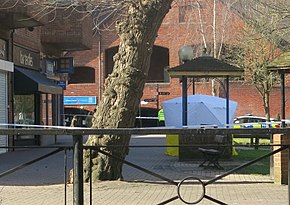
Yulia Sergeevna Skripal
(subsequently discharged):
The Skripals
Det Sgt Nick Bailey, Wilts Police.
Two other people were poisoned later, one died
and "Ruslan Boshirov"[2] (alleged alias of Colonel Anatoliy Chepiga)[3]
| Poisoning of Sergei and Yulia Skripal | |
|---|---|

A forensics
tent covers the bench where Sergei and Yulia Skripal fell
unconscious
|
|
| Location | Salisbury, Wiltshire, United Kingdom |
| Date | 4 March 2018 |
| Target | Sergei
Viktorovich Skripal Yulia Sergeevna Skripal |
| Weapons | A-234 (suspected chemical weapon used) |
| Victims | 3 admitted to hospital (subsequently discharged): The Skripals Det Sgt Nick Bailey, Wilts Police. Two other people were poisoned later, one died |
| Accused | Russian nationals "Alexander Petrov" (alleged alias of Dr. Alexander Mishkin[1]) and "Ruslan Boshirov"[2] (alleged alias of Colonel Anatoliy Chepiga)[3] |
On 4 March 2018, Sergei Skripal, a former Russian military officer and double agent for the UK's intelligence services, and his daughter Yulia Skripal were poisoned in Salisbury, England, with a Novichok nerve agent, according to official UK sources[4][5] and the Organisation for the Prohibition of Chemical Weapons (OPCW).[6] After three weeks in a critical condition, Yulia regained consciousness and was able to speak. She was discharged on 9 April 2018.[7][8] Sergei was also in a critical condition until he regained consciousness one month after the attack. He was discharged from hospital on 18 May 2018.[9][10] A police officer was also taken into intensive care after apparent exposure to the remnants of the toxic agent at Sergei Skripal's residence. By 22 March he had recovered enough to leave the hospital.[11][12][a]
In the 1990s, Sergei Skripal was an officer for Russia's Main Intelligence Directorate (GRU) and worked as a double agent for the UK's Secret Intelligence Service from 1995 until his arrest in Moscow in December 2004. In August 2006, he was convicted of high treason and sentenced to 13 years in a penal colony by a Russian court.[14] He settled in the UK in 2010 following the Illegals Program spy swap.[15] Sergei holds dual Russian and British citizenship; Yulia is a Russian citizen, and was visiting her father from Moscow.[16]
Later on 12 March, the British government accused Russia of attempted murder and announced a series of punitive measures against Russia, including the expulsion of diplomats, on the 14 March. The UK's official assessment of the incident was supported by 28 other countries which responded similarly. Altogether, an unprecedented 153 Russian diplomats were expelled.[17] Russia denied the accusations and responded similarly to the expulsions and "accused Britain of the poisoning."[18]
On 30 June 2018, a similar poisoning of two British nationals in Amesbury, seven miles from Salisbury, involved the same nerve agent.[19][20] A man found the nerve agent in a perfume bottle, in a litter bin, somewhere in Salisbury and gave it to a woman who sprayed it on her wrist.[21][22] The woman, Dawn Sturgess, fell ill within 15 minutes and died on 8 July, but the man who also came into contact with the poison survived.[23] British police believe this incident was not a targeted attack, but a result of the way the nerve agent was disposed of after the poisoning in Salisbury.[24]
On 5 September 2018, British authorities identified two Russian nationals, using the names Alexander Petrov and Ruslan Boshirov, as suspected of the Skripals' poisoning,[2] and alleged that they were active officers in Russian military intelligence.[25] On 26 September 2018, investigative website Bellingcat published a statement that it had positively identified the man known as Ruslan Boshirov as the highly decorated GRU Colonel Anatoliy Chepiga.[26] On 8 October 2018, Bellingcat revealed the real identity of the suspect named by police as Alexander Petrov to be Dr. Alexander Mishkin, also of the GRU.[27][28] A third GRU officer present in the UK during the time Sergey and Yulia Skripal fell into a coma has been identified as Denis Vyacheslavovich Sergeev, a graduate of Russia's Military Diplomatic Academy.[29][30] Denis Sergeyev is believed to hold the rank of major general in the GRU. The pattern of his communications while in the UK indicates that Maj Gen Sergeyev liaised with superior officers in Moscow.[31] The attempted assassination was allegedly organized by a secret Unit 29155 of the Russian GRU under command of Maj. Gen. Andrei V. Averyanov. The unit is allegedly responsible for destabilizing European countries and organized the Montenegrin coup attempt.[32]
On 27 November 2019, the OPCW global chemical weapons watchdog added Novichok, the Soviet-era nerve agent used in the attack, to its list of banned toxins.[33]